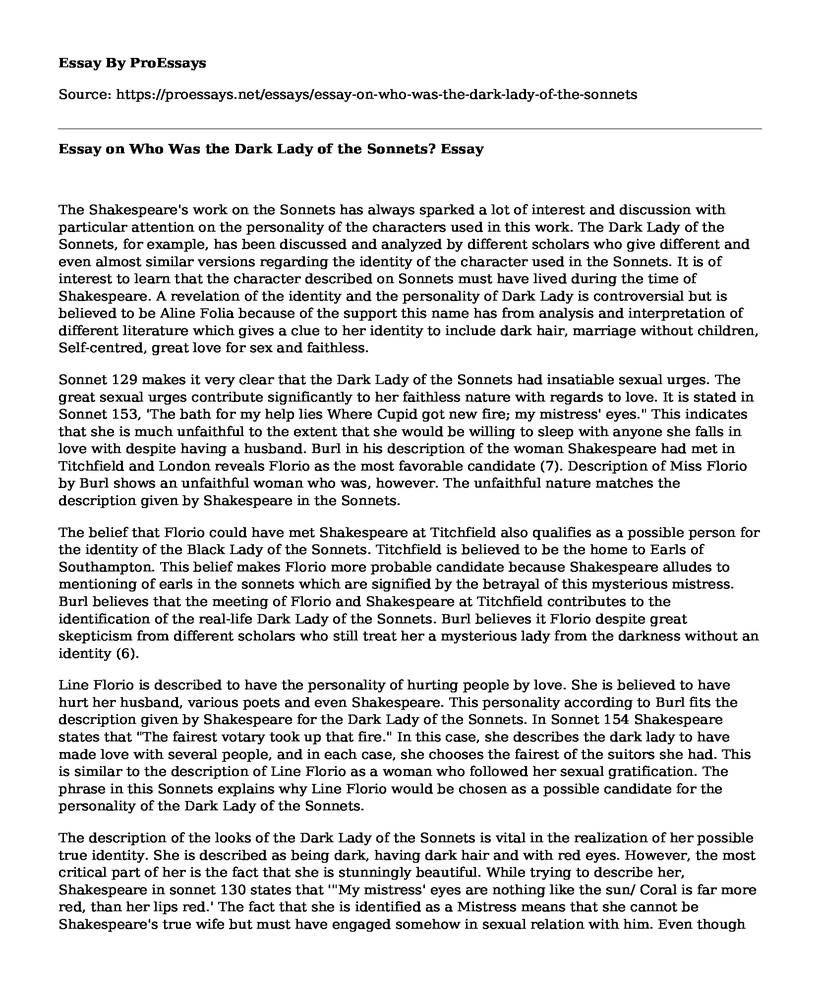The Shakespeare's work on the Sonnets has always sparked a lot of interest and discussion with particular attention on the personality of the characters used in this work. The Dark Lady of the Sonnets, for example, has been discussed and analyzed by different scholars who give different and even almost similar versions regarding the identity of the character used in the Sonnets. It is of interest to learn that the character described on Sonnets must have lived during the time of Shakespeare. A revelation of the identity and the personality of Dark Lady is controversial but is believed to be Aline Folia because of the support this name has from analysis and interpretation of different literature which gives a clue to her identity to include dark hair, marriage without children, Self-centred, great love for sex and faithless.
Sonnet 129 makes it very clear that the Dark Lady of the Sonnets had insatiable sexual urges. The great sexual urges contribute significantly to her faithless nature with regards to love. It is stated in Sonnet 153, 'The bath for my help lies Where Cupid got new fire; my mistress' eyes." This indicates that she is much unfaithful to the extent that she would be willing to sleep with anyone she falls in love with despite having a husband. Burl in his description of the woman Shakespeare had met in Titchfield and London reveals Florio as the most favorable candidate (7). Description of Miss Florio by Burl shows an unfaithful woman who was, however. The unfaithful nature matches the description given by Shakespeare in the Sonnets.
The belief that Florio could have met Shakespeare at Titchfield also qualifies as a possible person for the identity of the Black Lady of the Sonnets. Titchfield is believed to be the home to Earls of Southampton. This belief makes Florio more probable candidate because Shakespeare alludes to mentioning of earls in the sonnets which are signified by the betrayal of this mysterious mistress. Burl believes that the meeting of Florio and Shakespeare at Titchfield contributes to the identification of the real-life Dark Lady of the Sonnets. Burl believes it Florio despite great skepticism from different scholars who still treat her a mysterious lady from the darkness without an identity (6).
Line Florio is described to have the personality of hurting people by love. She is believed to have hurt her husband, various poets and even Shakespeare. This personality according to Burl fits the description given by Shakespeare for the Dark Lady of the Sonnets. In Sonnet 154 Shakespeare states that "The fairest votary took up that fire." In this case, she describes the dark lady to have made love with several people, and in each case, she chooses the fairest of the suitors she had. This is similar to the description of Line Florio as a woman who followed her sexual gratification. The phrase in this Sonnets explains why Line Florio would be chosen as a possible candidate for the personality of the Dark Lady of the Sonnets.
The description of the looks of the Dark Lady of the Sonnets is vital in the realization of her possible true identity. She is described as being dark, having dark hair and with red eyes. However, the most critical part of her is the fact that she is stunningly beautiful. While trying to describe her, Shakespeare in sonnet 130 states that '"My mistress' eyes are nothing like the sun/ Coral is far more red, than her lips red.' The fact that she is identified as a Mistress means that she cannot be Shakespeare's true wife but must have engaged somehow in sexual relation with him. Even though Shakespeare's personal life is least known, at least it is known that he had met Line Florio twice thus the allusion to her being the mistress described in these Sonnets.
Before the identification of Line Florio, Burl had a list of possible candidates for consideration for this position. The most favored candidate was Lucy Negro possible because of her personality. Lucy Negro otherwise known as Lucy Morgan was a brothel keeper and greatly indulged in prostitution. Additionally, most of the works of other scholars that were analyzed by Burl had settled for her as the possible identity for Dark Lady of the Sonnets. It is not, however, clear whether she engaged in sexual activities for self-gratification or if she did so because prostitution was her only means of survival. However, Holderness greatly support the belief that Lucy Negro is the dark lady of the Sonnets (64). He uses the personality of having dark eyes, dark hair and the typical engagement in sexual activities to justify his claims.
It is clear from the research work that the personality of the Dark Lady of the Sonnets is that sexual gratification and hurting of lovers and poets. Her personality contributes to the realization of her possible real identity which is believed to be either Lucy Negro or Line Florio. However, from the analysis of all the evidence tabled by the listed researchers, it is apparent that Dark Lady of the Sonnets is Line Florio.
Works Cited
Burl, Aubrey. "The Mistress of the Dark Lady Revealed." Shakespeare's Mistress. 5-6
Holderness, Graham. "Who Was William Shakespeare?." Memoria di Shakespeare. A Journal of Shakespearean Studies 2 (2015): 61-79
Cite this page
Essay on Who Was the Dark Lady of the Sonnets?. (2022, May 09). Retrieved from https://proessays.net/essays/essay-on-who-was-the-dark-lady-of-the-sonnets
If you are the original author of this essay and no longer wish to have it published on the ProEssays website, please click below to request its removal:
- Critical Essay Example of The Catbird Seat Story
- Literary Analysis of the Yellow Wallpaper
- Lady Macbeth as a Tragic Hero in Macbeth Essay
- Emily Dickinson: A Positive Romantic Poet - Essay Sample
- Essay Example on Death's Bitter Grip: Emily Dickinson's Immortality
- Extended Metaphors in Poetry: Exploring Its Use & Impact - Essay Sample
- Gods in the Ancient World - Essay Example







